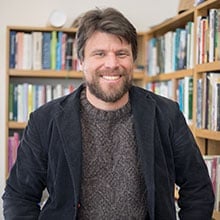

John C. Hausdoerffer PhD
Philosophy Program Coordinator, Professor of Philosophy
Contact Information
Academic Divisions
Communication Arts, Language & Literature DepartmentEducation
PhD., Washington State UniversityMA, St. John's College
BA, Western Colorado University
Biography
Dr. John Hausdoerffer is an environmental philosopher, teacher, organizational founder, and writer from Gunnison, Colo. He believes that peace between humans begins with a spiritual connection with a just distribution of the “ecosphere” that forms our local and global home. His books “Catlin’s Lament”; “Wildness”; and (forthcoming) “What Kind of Ancestor Do You Want to Be?” imagine how environmental health must come from and result in the healing of deep histories of social injustice and cultural trauma. “Dr. John” calls for a new ethic that views all places as part of our home, all generations of all beings as part of our scope of responsibility, and all actions as potential expressions of human care for the world. As he often says, “environmental ethics insists on humans as more than bodies that consume bodies in a global economy, insists that we are wholehearted beings capable of understanding and caring for the complex local and global systems that sustain us.”
Dr. John is the founding Dean of the Clark Family School of Environment & Sustainability and Director of the Master in Environmental Management (MEM) program at Western Colorado University. His MEM Program requires students to build resilient, and thus peaceful, communities around the world. The MEM program requires each student to complete a 600-hour on-the-ground Masters Project for a community organization anywhere globally, resulting in 25,000 hours of annual expert student work throughout Gunnison and as far as Yosemite, Yellowstone, Alaska, Mexico, Kenya, India, Costa Rica, and Colombia. Dr. John’s MEM program seeks to complete 1000 of these projects for global communities by 2040, making the Gunnison Valley a destination and hub for training agents of change, and a launchpad for sending those change agents around the world for, as he calls them, “livelihoods based on their values.”
Finally, Dr. John believes that peace emerges not just from individual actions, books, or academic programs; he believes that peace emerges from systems of change. To this end, he has co-founded numerous organizations dedicated to more resilient community systems. He co-founded the Coldharbour Institute with Butch Clark on 350 acres of land east of Gunnison, Colo., to exemplify sustainable mountain living in the Rockies. He co-founded the Resilience Studies Consortium to unite environmental programs from small, liberal arts colleges to provide what he calls “multi-place, place-based education” for students who use the diversely unique regions of the U.S. as hands-on, interdisciplinary “learning laboratories.” He co-founded the Mountain Resilience Coalition, merging Aspen International Mountain Foundation, Telluride Institute, and Western’s Clark Family School of Environment & Sustainability as the facilitators of the United Nations Mountain Partnership’s North America, Central America, and Caribbean region. Finally, Dr. John co-founded Gunnison’s “Sister City International” partnership with the Himalayan community of Majkhali, India in order to find shared climate change solutions between two “Headwaters Communities” on two opposing sides of this great planet.
Throughout his life, Dr. John’s dedication to peace has been driven by this question: what does the good life look like once we accept that all places are “here” and all eras are “now”? What does the good life look like if all peoples are considered as part of an equal humanity and if all species are considered as persons?